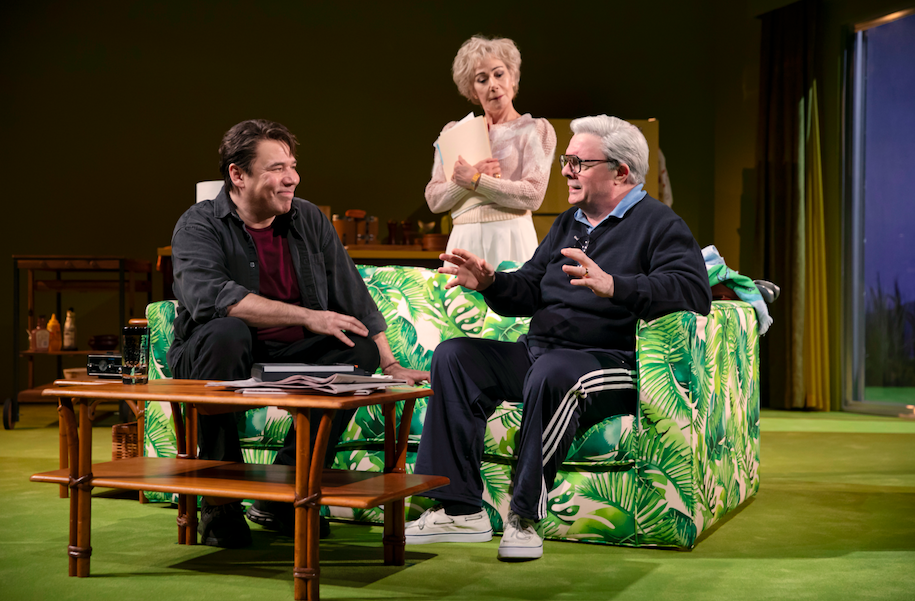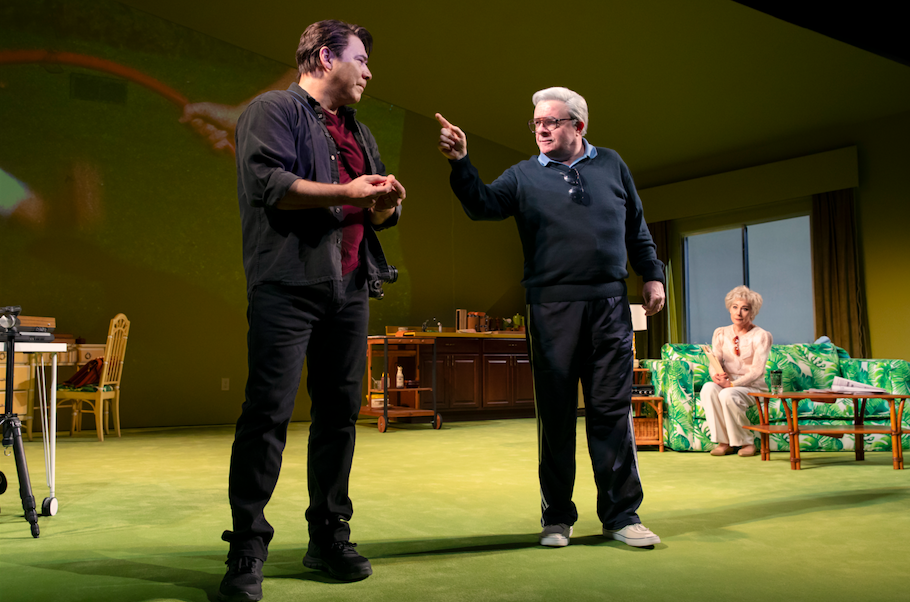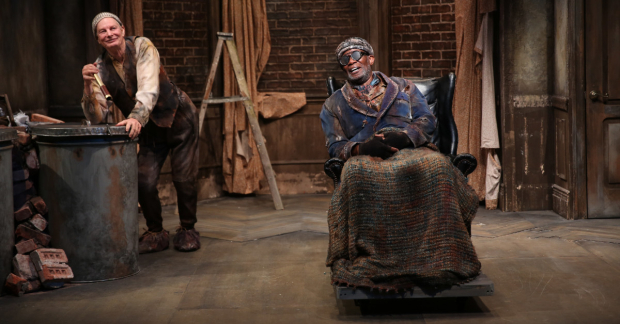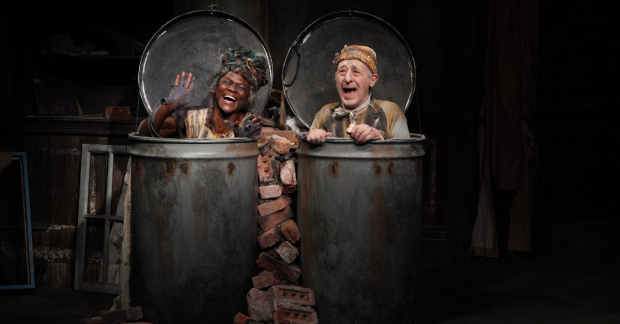The drama of the everyday and the ordinary are given vivid, rich life in Pictures from Home, Sharr White’s stage adaptation of Larry Sultan’s 1992 photo memoir, staged with precision by Bartlett Sher and acted with compassion and depth by three of the strongest actors from Broadway and the West End, Danny Burstein, Nathan Lane, and Zoe Wanamaker.

Credit: Julieta Cervantes
The premise is not particularly promising for a theater piece. In the early 1980s, Sultan, a photographer and teacher, began reviewing old home movies and photos, interviewing and taking shots of his mother and father in their San Fernando Valley home, searching for a hidden meaning in his childhood, their marriage and careers and his interaction with them. Such a conceptual, introspective construct might be fine for a book, but a play requires conflict. Sharr brings the conflict front and center by emphasizing the fraught dynamic between contemplative Larry (Burstein) and his competitive father Irving (Lane). During the main action of the evening, Larry’s project has been going on for several years, involving frequent visits from the son’s home in San Francisco away from his own wife and kids. Mom and dad—particularly dad—are starting to get more than a little antsy. “When is this thing gonna end?” Irving inquires with annoyance more than once. Sharr mixes in the added irritant of the parents’ imminent retirement to Palm Desert, selling their house and thus putting an end to Larry’s endless picking at the past.
As Larry probes deeper into his family’s history and asking uncomfortable questions, tensions mount until there’s an explosive confrontation during a family barbecue. Sher brilliantly stages this sequence, rising the exterior walls of Michael Yeargan’s appropriately lush setting into the flies, exposing the family’s emotional vulnerabilities as their physical shelter vanishes (Sher also used this disappearing set device in his revival of Awake and Sing which also starred Wanamaker.) Simmering resentments are physicalized with significant pieces of stage business as the meal is prepared. All three actors perfectly employ their actions to define their subtextual emotions. Burstein captures Larry’s desire to understand and capture his family’s images by insisting on making the hamburgers his way, without Worcestershire Sauce. Lane demonstrates Irving’s overbearing need to control by reshaping the meat and splashing the sauce on. Wanamaker as the mother Jean, wields a knife at her husband when he tries to tell her how to cut the vegetables. It’s a perfect scene and displays the colliding motivations with economy and humor, typical of the entire play and production. Yeargan’s set, Jennifer Tipton’s sensitive lighting and particularly 59 Productions’ projection design with photos of Sultan’s actual parents create a physical environment of overlapping memory, image and the characters’ perceptions of them.

Credit: Julieta Cervantes
But it’s not a perfect evening, at nearly two hours with no intermission, White does get repetitive, with the essential clash of views getting airings more than a few times. We hear Irv decry Larry’s choice of career, lack of ambition and clinging to his parents a bit too often. Another weakness is Jean’s not being given enough space to air her grievances. Towards the end, she finally gets to explain her position in the family and her anger at Irv for minimizing her success as a real estate agent after he has retired as a sales executive for Schick Razor Blades. Though Wanamaker gives these moments and her entire role full weight and strength, her part is not equally balanced with the other two.
Despite these flaws, Pictures is gripping and heart wrenching, despite the familiarity of the story. Irv’s restlessness and his adoration of surface-oriented success and the images of the typical American family echo the more tragic tropes of Death of a Salesman. Lane’s magnificent creation of Irv’s drive and bluster makes us yearn for his interpretation of Willy Loman. But, his performance here is still satisfying. His spot-on timing and physicalization of the 70-ish Irv capture a once vital man’s resistance to decline. Burstein beautifully conveys Lenny’s insecure and unsure stumbling towards a truer understanding of his past and his parents. Though she has less direct action than her castmates, Wanamaker creates a fully-fleshed, adoring, miffed mother, exasperated by her son and husband, whom she loves and who can set her off. Pictures contains all the intimacy, anger, rancor, sweetness and sorrow in your typical American family.

Credit: Carol Rosegg
Samuel Beckett’s clan in his Endgame is not so typical, but he was also writes about family dynamics in addition to the larger issue of how man copes with mortality as civilization crumbles. Currently revived Off-Broadway by the Irish Repertory Theater, Beckett’s 1957 one-act depicts a quartet of survivors of an unnamed apocalypse quarreling and coping through one day. Climate change, pandemics, and increasing nuclear tensions make the play more relevant than ever. Blind, bossy Hamm is confined to a wheelchair, unable to stand or move. His servant Clov is unable to sit and constantly roams about, griping about Hamm’s demands. Hamm’s parents Nagg and Nell, both apparently without legs, live in a pair of garbage cans. Doesn’t sound like much fun, but the play can be darkly comic. “There’s nothing as funny as unhappiness,” observes Nell as she converses on their untenable situation.

Credit: Carol Rosegg
Ciaran O’Reilly’s staging captures the hopeless tragedy of Beckett’s dark vision, but misses the heartbreaking comedy. Legendary stage clown Bill Irwin does give Clov a spectacularly comic physical life, pulling his legs around like a pair of heavy weights. He makes a simple task like climbing a ladder a portrait of Chaplin-esque whimsy. John Douglas Thompson endows Hamm with a shattered regality. He’s a broken-down king reduced to ruling a shadowy room. Unfortunately these two fine actors fail to establish the essential love-hate connection between their characters. Hamm and Clov are an end-of-the-world Laurel and Hardy, each setting the other off, despising the other, but they can’t separate because there is nowhere else to go. This conflict is the comedy, and it’s missing. There are moments of bleak humor from Joe Grifasi’s Nagg who resembles and delivers his lines like a vaudeville comic and Patrice Johnson Chevannes’ Nell who savors her brief moments out of the ashcan and celebrates the word “Yesterday” as a golden emblem of happier days. Set designer Charlie Corcornan creates an appropriately shabby setting which along with Orla Long’s ruined costumes and Michael Gottlieb’s stark lighting provide the right environment for a sorrowful but not comic enough Endgame.
